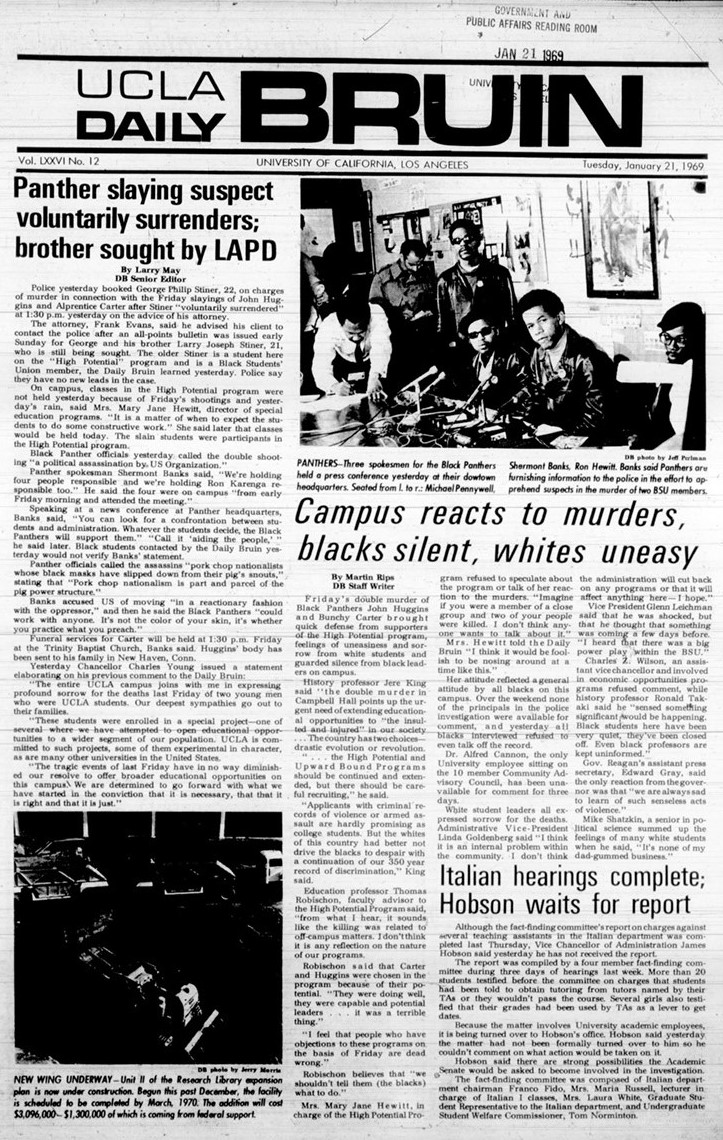The University of Los Angeles (UCLA) shootout between the Southern California chapter of the Black Panther Party (BBP) and the US Organization occurred on January 17, 1969. The shooting happened during a meeting of the Black Student Union at UCLA’s Campbell Hall, where the founder of the Southern California chapter of the Black Panthers, Alprentice “Bunchy” Carter, and Party member John Huggins (husband of Black Panther member Erika Huggins) was shot by the rival Black militant organization US. The shooting was a result of the ongoing tension between the groups.
The US Organization was founded by Maulana Karenga and Hakim Abdullah Jamal (A cousin of Malcolm X) on September 7, 1965, following the Watts Riots, while the Black Panther Party was founded on October 15, 1966, by Huey Percy Newton and Bobby Seale in Oakland, California. The membership of both organizations would grow significantly and expand to other cities across the United States.
Alprentice “Bunchy” Carter, once a member of the Slauson street gang in Los Angeles, established the Southern chapter of the Black Panther Party in 1968. The Black Panthers and US had different philosophies and tactics regarding African American issues while competing for the same potential recruits, a situation that created a rivalry between the two organizations. The Federal Bureau of Investigation (FBI) intensified the rivalry as part of its Counterintelligence Program (COINTELPRO) by sending forged letters to each group that purported to be from the other. The forged letters made each believe that the other was publicly humiliating them. In 1969, the rivalry between the two groups intensified, with each wanting different candidates to head the newly created African American Studies Center at UCLA.
On January 17, 1969, a gun battle occurred between the Black Panthers and US at the UCLA Campbell Hall during a debate over the leadership of the Center. Different accounts emerged to explain the shooting. One account said that Bunchy Carter and John Huggins were heard making derogatory comments about Maulana Karenga. Another account mentions a heated argument between US members and Black Panther Elaine Brown. Whatever the case, a gun battle ensued, which led to the deaths of Bunchy Carter and Huggins. The Black Panthers would later claim that the event was a planned assassination and that Carter and Huggins were unarmed. US members, however, insisted the shootout at UCLA was a spontaneous event. Panther member Geronimo Pratt, who was Carter’s head of security at the time, later stated the shooting was also a spontaneous shootout.
Claude Hubert, the person who allegedly shot Carter and Huggins, was never found. Following the UCLA shooting, US members George and Larry Stiner and Donald Hawkins, who were involved in the shooting, turned themselves in to the police. They were convicted of conspiracy to commit murder and two counts of second-degree murder. The Stiner brothers received life sentences while Hawkins served time in California’s Youth Authority Division.
A series of retaliatory shootings in the next couple of months would occur between the two groups. Local Los Angeles Black leaders condemned both groups following the shooting. Federal, state, and local police harassment, including the arrest or exile of founders of both organizations, as well as internal divisions in both groups, foreshadowed their demise over the next few years.
Do you find this information helpful? A small donation would help us keep this available to all. Forego a bottle of soda and donate its cost to us for the information you just learned, and feel good about helping to make it available to everyone.
BlackPast.org is a 501(c)(3) non-profit and our EIN is 26-1625373. Your donation is fully tax-deductible.
“UCLA Shootout between the Panthers and US,” It’s About Time,http://www.itsabouttimebpp.com/Chapter_History/FBI_War_LA_Chapter.html; “UCLA Shootout between the Panthers and US,” Daily Bruin, https://web.archive.org/web/20050322234437/http://www.dailybruin.ucla.edu/news/articles.asp?id=31776; Elaine Brown, A Taste of Power: A Black Woman’s Story, (New York: Doubleday, 1992).
Your support is crucial to our mission.
Donate today to help us advance Black history education and foster a more inclusive understanding of our shared cultural heritage.

